Impact Stories from Special Report Policy Area

Fellow(s): TechWomen leads dynamic delegation to Cameroon (continued)
Country:
Policy Area(s): Special Report
Cameroon Delegation Substories: After a day of cultural learnings, mentors and fellows came together for the first of several group dinners. U.S. Ambassador to Cameroon Christopher Lamora welcomed delegates to his residence for a reception focused on collaborative bi-national impact with STEM. Hundreds of students welcomed the delegation for hands-on STEM activities, pitch practice and career-focused lightning talks at Tassah Academic Complex in Yaoundé (above) and Lycee Polyvalent de Bonaberi school in Douala (below). Delegates spoke on a panel entitled, “Leading with Purpose in Challenging Times,” at the Leadership Development and Sustainable Impact Networking event in Yaoundé. Delegates led a design thinking workshop to identify creative solutions for challenges in waste management at Mountain Hub. Delegates discussed business development, sustainability, and supportive networks as women in business during “Women in Entrepreneurship.” In the final day, delegates were honored to have an audience with Queen Clarisse Manga Bell of Douala Sawa Cameroon.
Report Date...: 2/26/2024

Fellow(s): Farrah El-Iraky, Ghida Zbib, Iman Dankar, Imane BenKhelifa, Manal Ben Mahjoub, Mariam Haidar, Nadia Sabaneh, Naima Fatehi, Narmin Salah Mostafa , Nevien Farag Magdy, Nisreen Deeb, Rahma Tezzane, Rim Assaad, Sora Abu Nasser and Zeinab El Maadawi
Country: Algeria, Egypt, Jordan, Lebanon, Palestinian Territories
Policy Area(s): Special Report
15 TechWomen fellows from Jordan, Algeria, Egypt, Lebanon, Morocco, the Palestinian Territories and Tunisia were invited to the MENA region NextGen TechCamp held February 9-11, 2024 in Amman, Jordan.
15 TechWomen fellows from the Middle East and North Africa (MENA) region convened with TechGirls alumnae in Amman, Jordan from February 9 to 11 to take part in one of three NextGen TechCamps sponsored by the U.S. Department of State to commemorate the 10-year anniversary of the founding of these programs. Under the banner “Women Driving Digital Transformation in the Middle East,” fellows representing Jordan, Algeria, Egypt, Lebanon, Morocco, the Palestinian Territories and Tunisia came together for leadership and collaboration with local and international trainers to develop innovative solutions designed to drive both local and global challenges. Through workshops, panel discussions and networking opportunities, participants explored topics including generative artificial intelligence, data governance, design thinking and investment raising. Event highlights included mentorship from Bureau of Education and Cultural Affairs’ Deputy Assistant Secretary Professional and Cultural Exchanges, Nicole Elkon, who also participated in the fall delegation to D.C., and a reception at the residence of Yael Lempert, U.S. Ambassador to Jordan. “The emphasis on empathetic leadership and genuine connection resonated profoundly with our collective goal of amplifying women’s voices in tech and beyond,” shared fellow Imane BenKhelifa in a recent post. She was joined in Amman by fellows Farrah El-Iraky, Ghida Zbib, Iman Dankar, Manal Ben Mahjoub, Mariam Haidar, Nadia Sabaneh, Naima Fatehi, Narmin Salah Mostafa , Nevien Farag Magdy, Nisreen Deeb, Rahma Tezzane, Rim Assaad, Sora Abu Nasser and Zeinab El Maadawi.
Report Date...: 2/19/2024

Fellows play role in inaugural U.S. Department of State Alumni Summit in Morocco
Fellow(s): Salma Gherraby, Seloua Saoudi, Khadija Bencekri, Manar Ouaritni, Manal Ben Mahjoub, Mouna Edrissi, Sofia Chacham, Meriem Talibi Alaoui, Lamia Fikrat, Nezha Larhrissi and Lamiae Benmakhlouf
Country: Morocco
Policy Area(s): Special Report
Fellows play role in inaugural U.S. Department of State Alumni Summit in Morocco
Moroccan TechWomen fellows from across diverse cohorts celebrated the first ever U.S. Alumni Summit in Morocco held on January 27th at the Palais des Congrès Rabat Bouregreg. The event convened outstanding Moroccan alumni who have benefited from various programs organized by the U.S. Department of State, providing a platform for over 400 guests to celebrate their achievements and engage with accomplished speakers and Moroccan NGOs via panels, workshops and interactive opportunities.
The event opened with an exhibition and networking before moving into a series of morning sessions focused on NGO management, artificial intelligence use, and diversity, equity, inclusion and accessibility for NGOs. Following a lunch reception, the summit continued with welcome remarks from U.S Ambassador to Morocco Puneet Talwar, an award ceremony and an afternoon session covering the climate change crisis, social impact storytelling and digital security. The evening closed with a cocktail concert and engagement.
TechWomen alumnae engagement highlights included a keynote address from Lamiae Benmakhlouf (2016), General Director of Technopark Morocco, and the featuring of seed-grant funded impact project turned NGO eSTEM Morocco, which is headed by Nezha Larhrissi (2013). Other involved fellows included Salma Gherraby, Seloua Saoudi, Khadija Bencekri, Manar Ouaritni, Manal Ben Mahjoub, Mouna Edrissi, Sofia Chacham, Meriem Talibi Alaoui and Lamia Fikrat.
Report Date...: 01/29/2024

Mentor(s): Bidishi Roy, Cora Lam, Shawne Van Deusen Jeffries and Rita Horner
Mentor Type: Cultural, Impact, Professional
Policy Area(s): Special Report
IIE Co-President visits with TechWomen Mentors in SF
Mentors Bidishi Roy, Cora Lam, Shawne Van Deusen Jeffries and Rita Horner recently convened at the IIE San Francisco office to meet with Co-President Sarah Ilchman during her recent visit to the region to provide insights into their experiences with the global exchange program.
During the meet and greet, mentors discussed the value that not only they, but also their organizations have gained through their involvement in the program.
“Discussing how TechWomen has benefited Marvell Technology was a key focus, emphasizing the positive impact on innovation, diversity, and the opportunity to participate in a world class multi-country mentorship program, fostering a global perspective,” Cora expressed in a recent post.
Read More »Report Date...: 01/29/2024
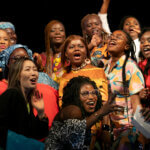
TechWomen hosts bi-city Pitch Day in Chicago and SF Bay
Fellow(s):
Country:
Cohort: 2023
Policy Area(s): Special Report
The TechWomen community gathered on Monday, October 16 for the Pitch Day program held consecutively in the Chicago area and the San Francisco Bay. The evening commenced with a keynote address from Britta McKenna, Director of Emerging Technology of Illinois Mathematics and Science Academy (IMSA) in Aurora, Illinois, where the event was hosted. Teams Algeria, Nigeria, Rwanda, Tunisia and Uzbekistan presented their three-minute impact project pitches first, then turned the stage over to San Francisco, which opened with a keynote speech from Dr. Wendy Okolo, a research engineer from the National Aeronautics and Space Administration (NASA). Following that, Cameroon, Egypt, Jordan, Kazakhstan, Kenya, Kyrgyzstan, Lebanon, Libya, Morocco, Pakistan, the Palestinian Territories, Sierra Leone, South Africa, Tajikistan, Turkmenistan and Zimbabwe presented their pitches. Each team was evaluated by a qualified panel of judges on their project’s social impact, sustainability and innovation. VisMed3D Chief Executive Officer Dima Elissa, and 1871 Director of Channel Partnerships Tenille Johnson sat on the panel in Chicago, while mentor Tina Shakour, a senior manager at Amazon Web Services, and Charlie Matar, a senior vice president at Synopsys held the post in the Bay Area. Special guests Melissa Kirschner of the Bureau of Educational and Cultural Affairs (ECA), and Edith Cecil, Senior Vice President of Government Programs at the Institute of International Education (IIE), also attended Chicago’s Pitch Day.
Report Date...: 10/16/2023
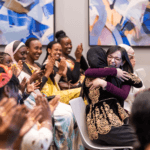
Seed grant winners announced at Community Celebrations commemorating close of city-wide TechWomen programs
Fellow(s):
Country:
Cohort: 2023
Policy Area(s): Special Report
On Friday, October 20, the TechWomen program completed its Chicago and San Francisco Bay Area programs with Community Celebrations held at Fulton Labs and Juniper Aspiration Dome, respectively. These events serve as a culminating milestone for the programs, where Emerging leaders, mentors, partners and supporters could gather to enjoy gallery walks showcasing each country team’s action plan, share highlights from the program, hear the much anticipated seed-grant winner announcements and connect around their common mission to drive global change. Keynote addresses were delivered by Dr. Azurii Collier, President and Board Chair of Women in Bio (SIB) in Chicago, and Hillary Weingast, Vice President and Global Head of Inclusion and Diversity at Juniper Networks in San Francisco. Following these remarks, select mentors and emerging leaders took to the podium to offer powerful insights on their cultural mentorship, professional mentorship and impact coaching experiences. To close out the evening, grant winners from Monday’s Pitch Day were announced. The first grant, sponsored by partner Amazon Web Services, went to Chicago’s Team Algeria, who plan to develop a data-driven application that will help Algerian women access accurate blood typing and donation services. The next two grants, sponsored by TechWomen, went to Team Zimbabwe to develop the Nyamukuta project to combat maternal mortality, and Team Palestinian Territories to create a STEM-based mobile application for young Palestinian students. The next grant, sponsored by partner Synopsys, went to Team Kazakhstan, whose AI-based application project will work to increase equity and transparency in public water distribution. To round out the winners circle, Team Lebanon won a seed grant sponsored by partner Juniper Networks to support their WeCare mobile app, which will bridge connections for Lebanese women seeking emotional, social and peer support as they battle breast cancer.
Report Date...: 10/16/2023
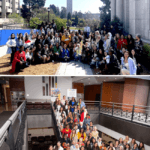
Mentor(s): 2023 Emerging Leaders arrive in San Francisco & Chicago for historical year of expansion
Policy Area(s): Special Report
On September 20, 2023 nearly 100 global Emerging Leaders arrived in Chicago and the San Francisco Bay Area, fulfilling the expansion mission announced by U.S. Secretary of State Antony S. Blinken during last year’s TechWomen@10 anniversary event. Emerging leaders from Algeria, Nigeria, Rwanda, Tunisia and Uzbekistan made landfall in Chicago, and those from Cameroon, Egypt, Jordan, Kazakhstan, Kenya, Kyrgyzstan, Lebanon, Libya, Morocco, Pakistan, the Palestinian Territories, Sierra Leone, South Africa, Tajikistan, Turkmenistan and Zimbabwe carried on to San Francisco. This cohort also includes the first alumnae of TechGirls, Houa Seghouani of Algeria and Khadija Bencekri of Morocco, to follow the path from TechGirls to TechWomen. The first half of welcome events included bi-state welcome orientations, a virtual program orientation, cultural workshops and a first-of-its-kind, simul-cast leadership workshop hosted by partner Chime at their offices in San Francisco and Chicago.
Read More »Report Date...: 9/18/2023
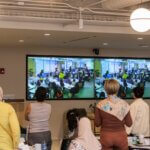
TW ’23 sees retooled Cultural and Leadership Workshops
Fellow(s): TW ’23 sees retooled Cultural and Leadership Workshops
Country:
Cohort: 2023
Policy Area(s): Special Report
As the TechWomen 2023 U.S. program takes flight, several workshops have seen innovations and reimagination for the historic Chicago expansion pilot. The Cultural Workshop has been reenvisioned from what was traditionally a cultural showcase event into a competency-building workshop, which was led this year by facilitators from Intercultural Communication Edge (ICEdge) Nancy Buchan in Chicago and Wendi Adair In San Francisco. The Leadership Workshop, meanwhile underwent a technological innovation, serving as a first-of-its-kind simulcast, hybrid event, seamlessly hosted by program partner Chime in both San Francisco and Chicago. The event featured mentors Samantha Raniere, who led the Clifton StrengthsFinder workshop, and Beth Steinberg and Samantha Krause of Chime, who served as keynote speakers.
Report Date...: 9/18/2023
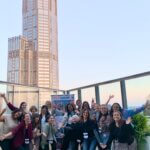
Fellow(s): Historical Chicago expansion launches with Mentor Kickoff
Country:
Cohort: 2023
Policy Area(s): Special Report
The inaugural in-person Chicago expansion event took place on September 12, when an all-new cohort of volunteers gathered at Nvisia for the 2023 Chicago Mentor Kickoff. The Kickoff allowed mentors to gain insights into their interconnected roles, network and discuss effective mentor-mentee partnerships. The event featured a virtual panel with experienced mentors Samera Edwards, Ateka Ali, Maya Bisineer and Donna Flores. “With each TechWomen mentorship, friendship and relationship, we’re sowing the seeds for the world we want to see,” shared program director Katie Zee, casting a vision for the newly inducted mentors. A companion kickoff took place two evenings later at Waymo in San Francisco’s South Bay.
Report Date...: 9/11/2023
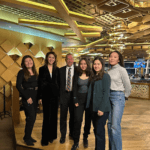
Kazakh fellows convene with IIE Co-President Jason Czyz
Fellow(s): Kazakh fellows convene with IIE Co-President Jason Czyz
Country: Kazakhstan, United States
Cohort: 2023
Policy Area(s): Special Report
On October 26, IIE Co-President Jason Czyz met with TechWomen Kazakh fellows Ainur Kuanyshbayeva (2020-2021), Aknur Karabay (2022), Dina Shaikhislam (2017) and Elmira Obry (2022) over dinner during a business trip to the capital city of Astana. During the event, fellows shared their experiences during and following the program and their work to help expand TechWomen’s mission of increasing access to STEM fields for women and girls and create a more equitable global community. Ainur Sembayeva of the U.S. Embassy in Kazakhstan also attended.
“I am continually motivated by the dedication and passion of the TechWomen team and their alumni,” Elmira wrote in a recent letter. “I look forward to future collaborations and am here to support our shared vision for progress in Kazakhstan and beyond.”
Report Date...: 10/23/2023

